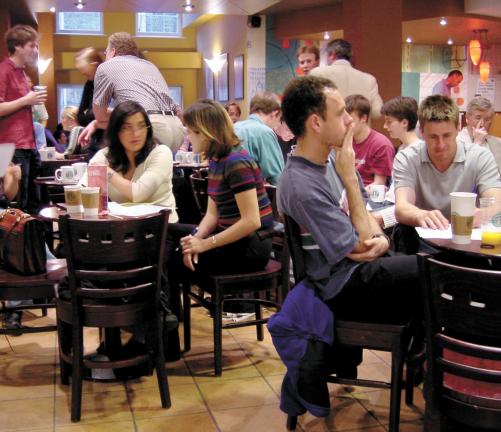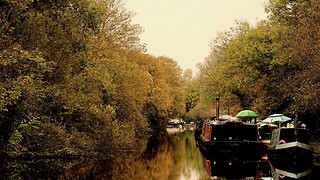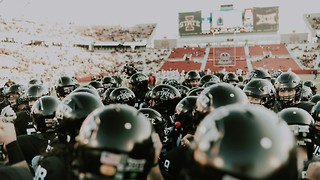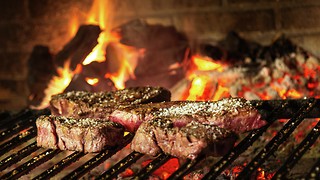Cafe Culture
Forget the lecture theatre: Sarah Lilian Stephen meets Dr Jordan Raff, the man taking science to Starbucks
It is easy to imagine scientists as Einstein-esque individuals from the Olympian heights of wisdom. They don white lab coats and fiddle with test tubes in an underground cavern, whilst a green solution is merrily boiling on a round-bottomed flask. But Café Scientifique is aiming to take science out of its academic context; a forum for the discussion of scientific issues, meant to be both informal and accessible.
 The Cambridge branch held its latest meeting at the Starbucks Café in Borders on the evening of January 29. People were invited to sit down, grab a cappuccino and listen as Dr Jordan Raff discussed his Cancer Research UK-funded project, something he told me was a “stimulating intellectual challenge.”
The Cambridge branch held its latest meeting at the Starbucks Café in Borders on the evening of January 29. People were invited to sit down, grab a cappuccino and listen as Dr Jordan Raff discussed his Cancer Research UK-funded project, something he told me was a “stimulating intellectual challenge.”
When greeted at the Gurdon Institute by a laid back man in jeans and a fleece, I am left wondering whether this is really the eminent group leader at the Wellcome Trust/Cancer Research Institute of Cancer and Developmental Biology. He is one of the leaders in his field, has been published in reputed peer reviewed journals and is a Director of the Company of Biologists along with Sir Tim Hunt, winner of the 2001 Nobel Prize for Medicine. Dr Raff seems committed to extending the appeal of science. With pride he tells me how some former outreach students soon learned that “some scientists are funny and have a good sense of humour. They’re very normal and they mess around.”
His interest in making science accessible to everyone meant that Café Scientifique was the ideal outlet. His work is ultimately aimed at revealing new ways of diagnosing and treating cancer in humans, and relies upon an analysis of the molecular structure of the centrosome, using fruit flies as a model system. He does admit that some of his experiments were “boring, time consuming and laborious.”
We just can't help using jargon and then it's completely incomprehensible to most of the audience
Microphones are not used, so not to detract from the café atmosphere. Dr Raff suggested that steady hum of coffee drinkers in such a popular café isn’t conduicive to such a presentation, whilst the bright lights and pillars make viewing difficult for those who are just passing through. He has argued for a change of venue - “You would attract passing customers in the bookshop who’d think ‘That’s interesting, I wonder what he’s talking about?’ But that’s why it didn’t work: if you just wandered in, it was very difficult to get involved.”
It ends up that people who hear about it through the University’s departments occupy the seating, whilst others are marginalised. How does this affect Café Scientifique’s stated mantra of informality, and its ability to attract a diverse and non-specialist audience? This is a question we don’t fully resolve, but one that clearly troubles Dr Raff.
There were forty people at the Café Scientifique talk; Dr Raff counted them himself. He quickly added that half of those were members of University and points out, “You are preaching to the converted. You don’t get people who become curious on seeing a poster which reads, “Fruit flies and cancer” and then think ‘I’ll go to that”’. On the other hand he is impressed by the attendance of some A-level students, “Inevitably you simplify as a presenter, but those kids were smart enough to see that what I was saying”. He does acknowledge, “We just can’t help using jargon. I start off quite simply and then very quickly people ask questions, I go off on a tangent and then it’s completely incomprehensible to most of the audience”.
Despite the the obvious enjoyment of the participants and the undoubted success of his address, this seasoned veteran of outreach programmes advocated change in time for future events. He often earnestly reiterated, “I think we have to do a lot of work to get this format right.”
Scientifique Stats
1989 - “Green Drinks” is founded in London, whereby environmentalists would meet informally in cafés. The movement has since become global, with branches in 22 countries.
1992 - Café Philosophique is started in France by pholosopher Marc Sautet.
1998 - The first Café Scientifique event is held in Leeds wine bar, borrowing heavily from the French model. Duncan Dallas, the founder , is said to have been inspired upon reading the obituary of the French philosopher.
2003 - The first event occurs in Cambridge, on “Mad Cow Disease”. The next event is in Starbucks, just just before exams begin, on May 31.
 Science / Who gets to stay cool in Cambridge?7 September 2025
Science / Who gets to stay cool in Cambridge?7 September 2025 News / Government allows Gazan students to take up university places6 September 2025
News / Government allows Gazan students to take up university places6 September 2025 News / Tompkins Table 2025: Trinity widens gap on Christ’s19 August 2025
News / Tompkins Table 2025: Trinity widens gap on Christ’s19 August 2025 News / News in Brief: bird sightings, brain cancer, and government bye-byes 7 September 2025
News / News in Brief: bird sightings, brain cancer, and government bye-byes 7 September 2025 Lifestyle / Take a punt, go on a Blind Date 7 September 2025
Lifestyle / Take a punt, go on a Blind Date 7 September 2025









